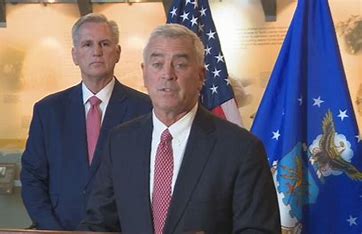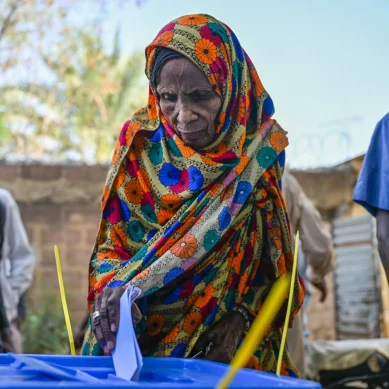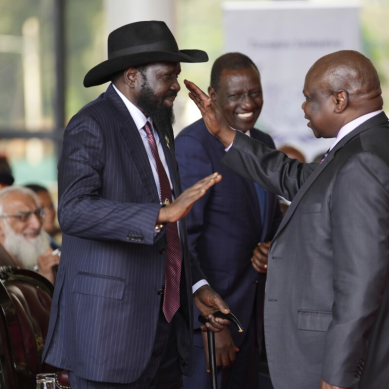
US scientists want federal fund for an independent oversight authority for gain of function research
If the US government can achieve the biosafety and biosecurity goals it has set for itself and work with partners in industry and civil society to further advance these goals, it will be a big win for reducing biological risks, scientists say.
Noting that gain-of-function research “can lead to a bioweapon,” the chairman of the House Select Subcommittee on the Coronavirus Pandemic Subcommittee Brad Wenstrup (Republican-Ohio) questioned on Wednesday last week witnesses about the positive contributions, if any, of that or dual-use research.
According to Gerald W. Parker, a former commander of the US Army’s bioresearch facility at Fort Detrick Parker, while gain-of-function research is “fairly common” and the “vast majority” of such research “can be done safely with appropriate institutional oversight,” there is an “exceedingly small area of gain-of-function research” that is “of concern.”
He described such research as “especially dangerous enhanced pathogen research” in need of “more oversight,” adding his belief that such research has not “contributed significantly to pandemic preparedness” and that such research he oversaw at Fort Detrick “did not affect any of our vaccine development decisions.”
Similarly, Parker said most dual-use research of concern is “improving our way of life, our health, our well-being, our economy, our agriculture” and that “these are important technologies that we need to continue to innovate.”
However, he noted that “there’s another side to that dual-use research” that is subject to “misuse.”
Jaime Yassif, vice president of Global Biological Policy and Programs at the Nuclear Threat Initiative, largely mirrored Parker’s views, saying that gain-of-function research is “important for advancing public health and development of medical countermeasures,” but that it needs to be considered alongside “downside risks of accidental or deliberate misuse,” adding that some such research “perhaps should not” continue.
Parker said the US could play a leading global role in setting biosafety standards.
“Because the United States is viewed as a model for biosafety and biosecurity, it will be necessary to make reforms at home to make the biggest difference worldwide,” he said, adding that the goal is “to harmonize standards and norms.”
Yassif said current international biosafety frameworks are insufficient.
“Biosafety and biosecurity are very weak globally,” she said. “According to the Global Health Security Index, only 6 per cent of countries have national-level oversight measures for dual-use bioscience research.”
“The International Biosafety Framework is primarily … in the form of guidelines and not regulations. And so, it is not enforceable,” she added, noting that it is also not as detailed as US guidelines.
Yassif said there is more work needed to improve domestic biosafety guidelines and international guidelines, practices and regulations.
Brad Wenstrup appeared to agree with the witnesses, stating his concern that research done outside the US limits needed oversight and increases the likelihood of lab leaks and accidents, while it “significantly impairs our ability to respond to emerging threats.”
“We must be able to effectively respond to and assess risks so that we can be prepared for our future pandemic, including the potential deliberate release of a biological weapon,” he added.
Parker made five recommendations for improved biosafety and biosecurity standards, including “a top-to-bottom holistic review of the entire biorisk management framework,” funding of an independent oversight authority by the federal government and incentivising “safer alternatives” to gain-of-function and dual-use research.
He also called for a “recommitment to international diplomacy,” spearheaded by the US State Department, “to elevate international biosafety and biosecurity harmonisation as a diplomatic priority,” and for a “national strategy for high-containment labs” to enable “sharing lessons learned, best practices and increased collaboration.”
Yassif admitted that modern bioscience could be “deliberately exploited by malicious actors or accidentally misused” and that such exploitation could lead to the “next global biological catastrophe.”
Yassif called for “dedicated financial investments for bolstering biosafety and biosecurity” for pandemic preparedness research and development funds, the creation of a dedicated US government office, the implementation of existing guidance and “political and diplomatic support” for similar international initiatives.
“If the US government can achieve the biosafety and biosecurity goals it has set for itself and work with partners in industry and civil society to further advance these goals, it will be a big win for reducing biological risks,” she said.
Parker called for “conversations” and “diplomacy” on “how to better strengthen the World Health Organization” (WHO).
Wenstrup was sceptical of the WHO’s ability to make independent decisions due to its relationship to the UN and “members that have a political agenda.”
Responding to these concerns, Parker said that “first and foremost [WHO] member states … have a responsibility” to ensure they have “appropriate guidelines, laws, regulations” and “the appropriate skilled workforce, funding and so forth.”
Yassif said that, even with such goals, “the enforcement part is going to be really challenging” and requires “a shared understanding globally of what the rules of the road are and what are the best practices for biosafety and biosecurity.”
“The WHO is one place that can carry out this work,” Yassif said, adding that “state and local public health capabilities are [also] critical, and we do have to resource them at the level that’s necessary so they can perform their role.”
Parker agreed, stating a “need to provide the right tools” to “local and state colleagues, whether that’s public health, emergency management, the private sector, NGOs.” When asked by Wenstrup whether the US is prepared for a future pandemic, Yassif simply said “No” while Parker said, “We are not prepared.”
“We know that the American taxpayer was likely paying for some of this dangerous research,” Wenstrup said. “We cannot afford to have another Covid-19 pandemic. We cannot allow dangerous research to continue without proper safeguards in place because the next time might be worse.”
Wenstrup said that calls for more regulation of scientific research, including gain-of-function research, are not an attack on science.
“Desiring more laboratory safety and more oversight isn’t to chill the scientific community from engaging in research,” he said, “but to ensure we’re taking every precaution necessary to protect the public from escaped pathogens – of which, we cannot control, nor fully understand the consequences until it’s too late.”
In a departure from the sometimes contentious nature of previous meetings of the Subcommittee on the Coronavirus Pandemic, ranking member Rep. Raul Ruiz (Democratic-California.) largely agreed with Wenstrup’s statements.
“Bolstering international biosafety is at the heart of our efforts to prevent future pandemics,” he said. “The existing framework for ensuring that research across the globe occurs safely relies on a patchwork of non-enforceable standards and guidance.”
“Beyond these international guidance documents, it is incumbent upon each nation to enact its own policies and standards to promote biosafety,” Ruiz added.
Parker suggested that “safer alternatives” to gain-of-function and dual-use research should be “really incentivized,” and “can be used for answering the basic science questions for most of these proposed research proposals.”
Wenstrup said, “As we move forward, we must make sure that our standards and capabilities can effectively respond and assess risks related to new research and biotechnologies — including those capable of unleashing new pandemics.”
For Boyle although, “The best way to protect the American people is to shut down all BSL-3s and BSL-4s immediately.”
“They all leak offensive biological warfare weapons,” he said. “The next pandemic is definitely coming out of those BSL-3s and BSL-4s if we do not act now to shut them down immediately. There is no legitimate scientific or medical reason for these BSL-3s and BSL-4s.”
- The Defender reporter










